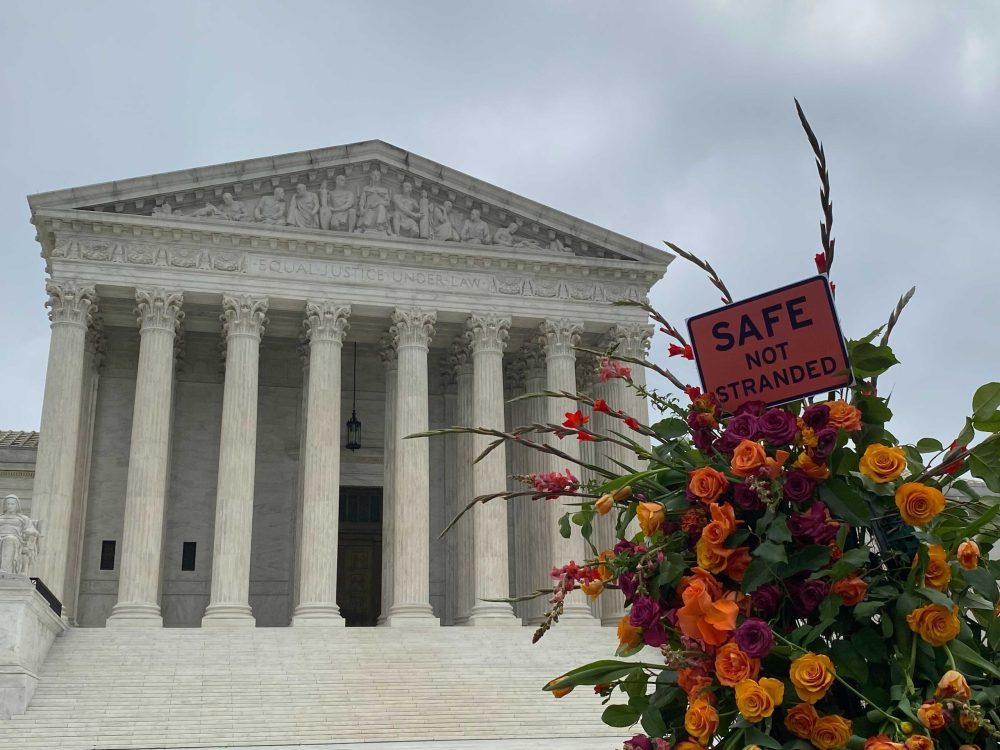WASHINGTON – Protesters rallied outside the Supreme Court on Tuesday as justices heard arguments over eliminating the Trump-era border policy that has kept migrants in Mexico while waiting for their asylum hearings.
At issue before the nation’s highest court is the extent of the Biden administration’s authority to change federal immigration policy. The administration plans to end the so-called “remain in Mexico” policy next month, reversing a 2019 decision by then-President Donald Trump to stop asylum-seekers at the southern border from entering the United States.
“This policy does not protect people from seeking asylum. Instead, it puts people seeking refuge and protection in more danger,” Ray Rodríguez, who was forced to wait in Mexico for 10 months, told the rally.
“Seeking asylum is a human right,” Rodríguez said. “No human should be forced to remain in danger in Mexico while waiting for asylum claims. (The policy) must end now.”
The protest, which organizers called the “Safe Not Stranded” rally, was backed by over 60 immigration advocacy groups including the Catholic Legal Immigration Network, the American Immigration Council, the Justice Action Center and FWD.us.
“Today is a big day,” Tania Guerrero, immigration attorney at the Catholic Legal Immigration Network, told Capital News Service. “We rallied in front of the Supreme Court in hopes that society at large, but specifically people related to this case, will listen, and how horribly inhumane and unjust ‘remain in Mexico’ policy is.”
Guerrero said she worked at the southern border for two years to help asylum-seekers seek protection. She said the “horrors” she saw “will always be with me.”
“I honestly feel very overwhelmed and terrified,” Guerrero said. “There’s people that are decision makers, that are not respecting the rule of law, it’s just purely overwhelming.”
At the morning protest, where those affected by the policy and attorneys representing asylum-seekers spoke, people wore orange t-shirts, carried flowers and waved signs that said “#SafeNotStranded.”
“‘Safe not stranded’ means that they are going to be given equal justice and they’re going to be allowed to remain in this country without being placed back into the hands of danger,” said Allen Morris, a policy and government affairs strategist for RAICES (the Refugee and Immigrant Center for Education and Legal Services) Texas, a nonprofit agency that provides low-cost legal services to immigrant families.
“My hope is that the highest court of the land can see everything for what it is and can see that this is something that has to end and they can make the overall call for it,” Morris said. “And unfortunately, the bureaucracy of what that looks like is still very tainted and damaged and rooted in racism.”
Jane Bentrott, a lawyer at Justice Action Center, said she doesn’t think the “remain in Mexico” policy has gotten enough public attention.
“What the court decides on these issues that they discussed today will have a really, really important effect, both for immigrants rights, and also the potential for future presidents to enact the policies that the voters supported and in elections,” Bentrott said.
Bentrott added that there are broad ramifications of keeping or changing the policy.
“This can have tremendous foreign policy implications, tremendous implications for democratic accountability and it will have huge implications for the safety and welfare of those humans who are seeking asylum,” Bentrott said.

